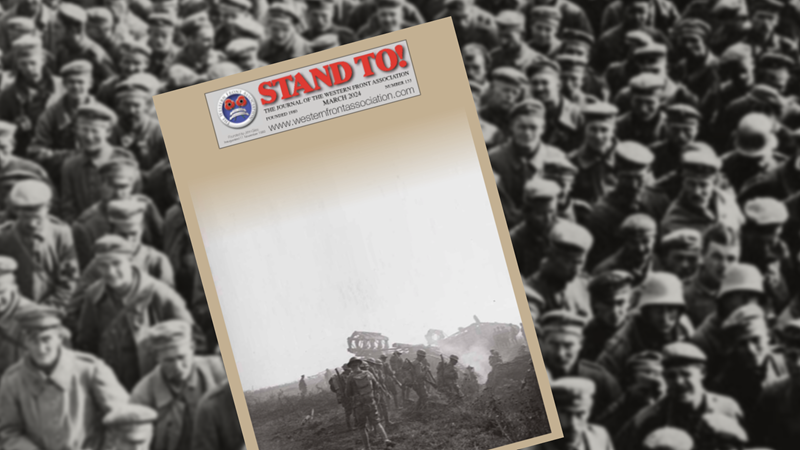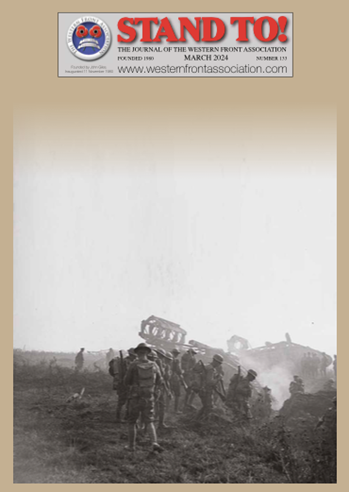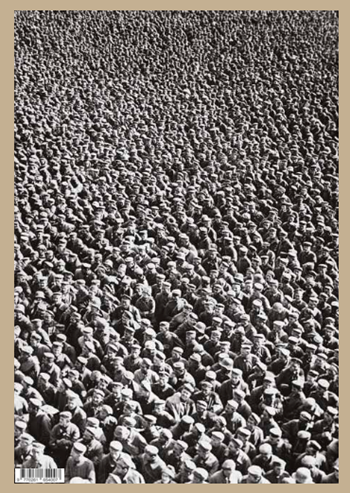Stand To! March 2024 Number: 133 Editor's Introduction and contents
- Home
- Latest News
- 2024
- April 2024
- Stand To! March 2024 Number: 133 Editor's Introduction and contents

From the Matt Leonard, Editor Stand To!
Welcome to the (slightly delayed) first Stand To! of 2024. My apologies for the wait – some things can’t be helped – and there will still be four issues published this year.
On that note, I would like to begin by thanking you for the feedback I’ve received regarding last year’s special issue. It was an interesting exercise to compare and contrast the shared history between the two conflicts, and one that was certainly worthwhile. I’m glad it was so well-received, but this month we return to our core area of interest. As usual, Bob and Steve (and family) bring us their latest Camera Returns, this time visiting Aveluy in search of a tank driving school, and Andrea provides her usual excellent selection of book reviews. We are also proud to bring you two essays from the winner and a runner-up of the Colin Hardy Memorial Prize Competition. As many of you will know, the annual competition is open to 16–19-year-olds and runs under the auspices of the WFA while being generously sponsored by the Hardy family. This year’s top prize was won by Lizzie Kenyon-Muir of Hockerill Anglo-European College for her essay on the enfranchisement of women in Britain around the First World War. It is an excellent and informative read. Runners-up were Rose Hall of Brighton College and Arthur Beresford-Jones of the Stephen Purse Foundation in Cambridge. Arthur’s essay is also published here, a fascinating study in how ethnic communities were treated by some of the war’s main belligerents. I’m sure you will join me in congratulating all three students on their success.
Also in this issue, David Zabecki discusses Operation HAGEN, detailing the great German master plan that never was, and Greg O’Reilly (with help from Jeffrey McNeill) brings us the latest in his machine gun series, this time looking at the Battle of Messines and the effectiveness of indirect fire, something Greg and Jeffrey argue was as important to the outcome as the famous mine detonations ‘heard in London’. Elsewhere, Michael Lucas discusses the dismissal of Major General Sir William Douglas, illuminating the war lives of senior officers and the struggles they often faced in retaining their commands as the war progressed and developed.
Additionally, we present four articles looking at those marginalised by the war. Harry Potter discusses the fate of Private Loader, convicted and condemned for desertion. Private Loader’s tale is a sorry one, but perhaps more uplifting is the story of Alexander Paterson, a ‘prisoner’s friend’ who defended Loader, doing his utmost to spare him the firing squad. Private Loader’s transgressions occurred in Flanders, but there were many who never crossed the Channel, proclaiming themselves Conscientious Objectors, morally opposed to war. For these men a long and hard prison sentence awaited, and Frances Hurd tells of the privations they suffered in Wormwood Scrubs, and the lengths to which many went to preserve their humanity in the most difficult of conditions. Back at the front, James Wearn and Jenny Martin recount the story of two men, one British, one German, who faced each other across the wire in late 1916 near the village of Ginchy. It’s a tale that could be told about many, and vividly brings home the individual costs of war. Last but not least, Michael O’Brien narrates the story of the Kick family, members of the Oneida Nation who signed up to fight for the ‘mother country’. The Kicks, and many others like them, hoped their war efforts would lead to a better life for themselves, their families and their communities. Sadly, they were largely mistaken. Until next time.
The Editor is always prepared to consider original articles for publication and they should be sent to him by email: standto@westernfrontassociation.com or drmgpleonard@gmail.com


Front Cover: Attack on Hindenburg line. Tanks and Troops advancing. Image by David McLellan / National Library of Scotland.
Back Cover: Prisoners Captured Germans soldiers, about to be put through a clearing station. Image by David McLellan / National Library of Scotland.
|
Contents |
Pages |
|
Operation HAGEN: Ludendorff’s Flawed Master Plan to Win the First World War by David Zabecki |
3-9 |
|
The Camera Returns by Bob Grundy and Steve Wall |
10-11 |
|
The Sacking of Major General Sir William Douglas by Michael Lucas |
12-15 |
|
Justice Unleavened by Mercy: The fate of Private Loader by Harry Potter |
16-21 |
|
Conscription and Reform of the British Penal System by Frances Hurd |
22-27 |
|
Machine Guns and the Battle of Messines by Greg O’Reilly and Jeffrey McNeill |
28-34 |
|
Being an account of the military careers of the Kick family in the Great War by Michael O’Brien |
35-38 |
|
Fighting Over A Corner of A Not-Forgotten Field: Two men on opposite sides of the line during the Battle of Ginchy by James Wearn, Jenny Martin (with Helen Basson) |
39-44 |
|
Colin Hardy Award Winner for 2023: Lizzie Kenyon-Muir. To what extent was the First World War the main reason for the enfranchisement of women in Britain? |
45-48 |
|
Colin Hardy Award Runner-up for 2023: Arthur Beresford-Jones. Did the First World War create greater unity or more tension between ethnic components of empires fighting on the Eastern Front? |
48-51 |
|
Garrison Library (Book Reviews) |
52-IBC |





